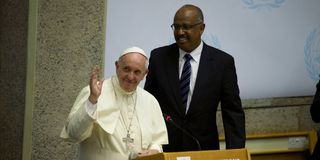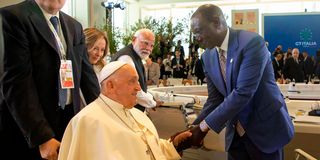Premium
When Pope Francis used Nairobi as a pulpit to confront Africa’s problems

Pope Francis with former UN Official Nasser Ega-Musa.
What you need to know:
- He emphasised shared values, condemned violence in the name of religion, and spoke out against anti-Muslim prejudice. He believed deeply in building bridges, not walls
- And even after he returned to Rome, his voice continued to resonate on issues close to Africa’s heart. He became one of the strongest moral advocates for African migrants trying to reach Europe—risking everything in search of safety and dignity
Many of us had been bracing for the worst regarding Pope Francis’s health. Yet when that moment finally came on Monday, it still landed with a jolt. What wasn’t surprising, however, was the profound sorrow that followed—a collective ache rooted in the knowledge that this good and decent man will no longer be a voice of solace, hope, and moral clarity in a world that often feels unforgiving to the poor, dispossessed, victimised, and downtrodden.
Here in Kenya, we felt his warmth and basked in his solidarity when he visited our country in November 2015. He came to our region on a mission of peace and reconciliation.
Pope Francis wasn’t the first pontiff to grace our nation—Pope John Paul II visited three times, all during the seemingly unending Moi presidency, which now looks almost enlightened in comparison to some of his successors.
But this Pope arrived at a different moment—when the economy was faltering, corruption was normalised, ethnic identity had become the political currency of choice, and public trust in leadership was at rock-bottom. If ever there was a country in need of a spiritual reboot, it was Kenya in 2015—and Pope Francis delivered.
He made both grand and humble gestures, offering a new kind of “Nyayo” for the ‘wanainchi’ while highlighting the greed and excesses of the ‘wenye nchi’. He won many hearts by rejecting the government-provided limousine in favour of a modest ‘baby Honda’—in a country where VIPs often move in convoys of luxury SUVs.
But perhaps the most powerful moment of his visit came in Kangemi—a sprawling slum of tin shacks and open sewers—where he stood shoulder to shoulder with the marginalised and spoke directly to the injustice of their condition. He challenged the local clergy to speak boldly against corruption and inequality, calling out the very forces that had deepened suffering across the country. That moment, more than any ceremony or headline, captured the soul of his visit.

President Willliam Ruto with Pope Francis at the 50th G7 Summit, in Apulia, Italy on June 14, 2024.
At the UN Office in Nairobi, where I moderated his speech, Pope Francis called on world leaders to forge a meaningful agreement on climate change at the upcoming COP21 summit. But he went further—urging a shift in global development models to reduce emissions and prioritise human dignity.
He used Nairobi, too, as a pulpit to address Africa’s broader challenges. He condemned the illegal exploitation of the continent’s resources and the persistence of “economic colonialism” long after the flags of independence were raised. He urged the West to rethink its relationship with Africa—not as a place of pity, but as a continent brimming with human potential.
Kiss for peace
His compassion extended beyond our expectations. Who could forget that moment, a few years later, when he struggled to kneel and kissed the feet of South Sudan’s warring leaders, pleading for peace? “I am asking you as a brother to stay in peace,” he begged. “I am asking you with my heart—let us go forward.” They acquiesced to his plea - but only to revert to form shortly after.
Interfaith dialogue, too, was a central theme during his visit. On his second day, he devoted time to promoting peace between Christians and Muslims. He emphasised shared values, condemned violence in the name of religion, and spoke out against anti-Muslim prejudice. He believed deeply in building bridges, not walls.
And even after he returned to Rome, his voice continued to resonate on issues close to Africa’s heart. He became one of the strongest moral advocates for African migrants trying to reach Europe—risking everything in search of safety and dignity. Pope Francis condemned the West’s hardening stance on migration as a “grave sin.” He reminded the world that rescuing those at sea is not a political debate—it is a “duty of humanity.”
Throughout his papacy, he reminded us that faith without compassion is hollow. Those who believe in Jesus, he often said, cannot forget his teachings about the homeless, the hungry, and those forced to live in conditions unworthy of their dignity.
As the selection of a new pope gets underway, we must remind the College of Cardinals that the world is in peril—torn apart by powerful and misguided leaders. What humanity needs now is another pontiff with an unwavering commitment to inclusion and justice, a deep compassion for the vulnerable, and the moral courage to inspire not just the Catholic faithful, but millions across the globe, regardless of belief or background.
Editor, Africa News Edition and formerly a UN Official

